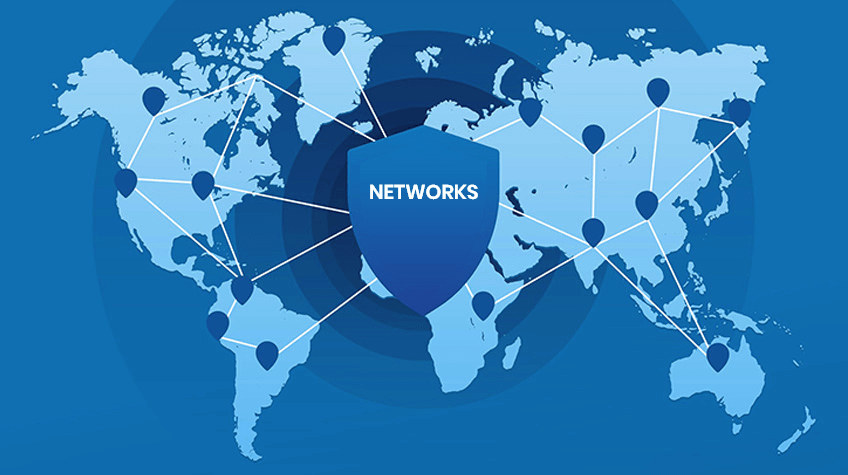
A private network is a computer network that utilizes a private address. They are widely used for LANs at offices, homes, and institutions. These addresses are decentralized, and there’s no regulatory body that issues them. This means that anyone can use private and enterprise networks without someone’s approval.
Such freedom is very attractive for every individual and private enterprise. Becoming the operator themselves without a need to get services from a side company can be extremely beneficial, so more and more people and companies turn to private cellular networks.
They have been around for quite a while: 3G, 4G, you name it. Thanks to the outstanding reliability and speed, these networks are used by utility companies, academic websites that provide research papers help, and large multinational corporations. Even if the public network is not working, a private one is fully secure and continues operating.
Actually, any enterprise that worries about its safety and needs to ensure uninterrupted work should consider a private network. It reduces the threats of espionage and malware to the minimum and gives an opportunity to share data freely and without any worries.
Another difference between private and public networks is that the first one can be used in remote locations when public coverage is absent. For example, agriculture and mining. Private networks are literally their only option to communicate, send files, and share data. To prove their popularity, look at the stats: one-third of manufacturers and a half of industries are planning to apply for a 5G license. 80% of all US-based companies are ready to pay for a private network.
Manufacturing companies are at the forefront of implementing these technologies. According to the GSA, there are more than 50 companies that already have the required licenses. Academic institutions are also rather active and test private networks both for desktop and mobile usage. At the moment, security and public safety are the most common sectors that use a private enterprise network. And we shouldn’t forget IT companies who are actively investing in the development of these technologies.
5G is the future
The first thing to do to develop the right network is to choose a technology it should be based on. The majority of enterprises should stop their choice of 5G. For many reasons, it is the best solution, and the first one is that the 5G infrastructure and devices are going to stay in the market and lead it for at least 15-20 years. This means that even when mobile operators decide to switch to 6G, 5G will remain in service for quite a while without a need to be replaced.
Another advantage is the performance that is adjusted to a variety of specific requirements. Here are the capabilities that you can benefit from:
- The guides on how to manage cybersecurity risks
- Enhanced Mobile Broadband or eMBB. It is especially good for demanding applications.
- Ultra-reliable low-latency communications or URLLC. They allow 1-millisecond latencies, which are perfect for applications that require the absence of delays.
- Massive machine-type communications or mMTC. With their help, the 5G network can support an impressive 1 million devices across a square kilometer.
When evaluating the sellers of devices and infrastructure, you need to make sure that you have the necessary abilities to support the 5G capabilities. Whether we are talking about mMTC, URLLC, eMBB, or others, some of them are so complex that they are still under construction for the 3rd Generation Partnership Project.
The next thing you should take into account is the cost of devices. You probably know that the newest devices have the best 5G adaptability. For example, the iPhone 12. But it is one of the most expensive devices on the market. And what if an enterprise needs thousands of them? Most likely, they will purchase something simpler and cheaper. Something that won’t be able to support 5G and all of its capabilities.

You need to remember that private enterprise networks take time to develop, test, and launch. This means that they are quite pricey, especially if you want to possess the latest technologies and achievements. In a year or two, when the network is going to be used by everyone and their dog, the prices on devices and technologies will be more affordable.
The next thing you shouldn’t forget to ask the potential suppliers of the network is whether they can support the required applications. For example, time-sensitive networking or TSN on the basis of 5G has been tested only in trials and not in real-world conditions. This means that if you need a perfectly working TSN, it is important to check whether the network vendors can meet this requirement.
When choosing the network, you should also consider whether to utilize a licensed or unlicensed spectrum. Or, as a third option, both of them. Fortunately, there are lots of suppliers in all categories. But you may face another problem – the requirements of every country. For example, in the US, Citizens Broadband Radio Service users have priority access to the free spectrum. That is why you should pay attention to the local requirements because they might significantly impact the available options and prices.
At the moment, there are almost 200 private networks worldwide which means that if you are still considering starting a private enterprise network, your competitors might already have one. But this doesn’t mean that you have already missed the bus. 5G devices and infrastructure are growing, and it is still the right time to open a private network. The benefit is that the prices are already going down, so even if your enterprise or application doesn’t have a big budget, 5G might be a good option. If you have ever thought of investing in a private network, consider this article a sign!
Main advantages of private networks
If we were asked to name three main advantages of private networks, we would probably name the following:
- Availability
- Safety
- Reliability
Everything Is quite clear with availability. In the mines, somewhere deep in the states, public networks are not available. But people need communication and data transmission, so private enterprises become not optional but crucial.
If you want to minimize the risks connected with malware software and outside attacks, private networks are great. Their security is top-notch, and the SIM-based control can be named a significant advantage.
Reliability has also been discussed in the article above. Private networks can boast low latency and outstanding performance. They carry only files of their own which boosts the speed. Plus, no changes and disturbances impact the network. This is especially important for demanding projects that involve huge data transfers and lots of measurements for example, streaming videos, drones, and manufacturing.
But these are not the only advantages, and we can go on for hours discussing all the perks that private network owners can receive. For example, you can easily share the network with people or companies in nearby areas.
You can easily manage the security and systems, which is almost impossible to do within a Wi-Fi network. Quite often, individuals and enterprises turn to private networks after failed attempts to transfer information via Wi-Fi. If you move away from the base station, the connection is lost. Especially if the object that transmits data moves (a truck or medical device, for example). That is not a problem with a private network. The base station is your property, so it can be moved anywhere you want.






